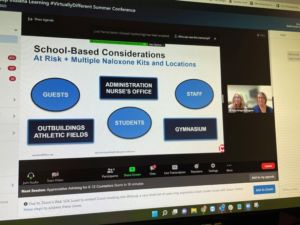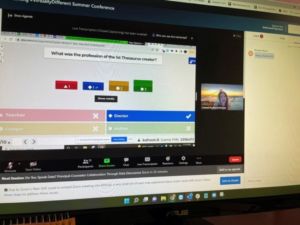
This summer, I was fortunate to be a part of Keep Indiana Learning’s #VirtuallyDifferent Summer Conference in June, hosting pre-event webinars with sponsors and then attending the two day event which brought over 1,100 participants around the state and beyond.
If you attended from the comfort of your own home, vacation cottage, or even poolside, you experienced more than a change of scenery from the typical get together with colleagues. However, if you were still winding down operations at your school or catching a much needed vacation, Keep Indiana Learning is still here for you!
- Want to purchase an “all access pass” to all 90+ recorded conference sessions for only $20? We’re ready for you!
- Want to see the speaker list before deciding? We’ve got you covered!
- Already purchased a #VirtuallyDifferent conference registration? Your sessions await!
Now, all attendees can review inspiring sessions in more than two dozen different and cross-tagged “tracks” relevant to role, academic topic, or particular student population served, to make sure that the 2022-2023 school year launch here in Indiana is scaffolded by best practices wherever applicable.
Though virtual conferences are no substitute for the in-person events we’re more accustomed to, they are as valid for professional networking and problem-solving as the blended and online learning we offer our students. Attendees may have to be more engaged than when traveling to a different city and dedicated conference location, but the content is just as powerful in shaping our practice.
“The content is just as powerful in shaping our practice.”

And with formidable challenges affecting the entire field of education, there isn’t an Indiana school district that can’t benefit from continuing to seek ideas, resources, and experts to employ in updated strategic plans. So, for the thousands of registered educators across the state, this event continues to hold value for leaders and classroom teachers alike. Here are just a few examples of the highlights worth reviewing and sharing with your colleagues.
“With formidable challenges affecting the entire field of education, there isn’t an Indiana school district that can’t benefit from continuing to seek ideas, resources, and experts to employ in updated strategic plans.”
Equity, Front & Center
One continuing area of need for all Indiana districts is redesigning our systems to be fitting for the needs of all learners. The conference kicked off with a pronounced equity stance. Many of the opening sessions were dedicated to continuing the dialogue for making teaching and learning accessible and equitable for all. Teachers, administrators and other education experts shared information for change dispositions and employing tactics to affect change for students in need, across the spectrum. Educators brought the audience current with information for better serving the needs for various cohorts of our learners including students of color, gender/sexuality consideration, and those from low socio-economic backgrounds. For more, consider these session videos:
- Identity Affirming Schools and Classrooms Center Equity and Humanity
- Digital ≠ Accessible – Learn How to Reshape & Renew Your Content in Canvas to Make it Universally Accessible for All Students
- Reshaping Instruction for Emergent Bilinguals – A Guide to Translanguaging for Teachers Who Don’t Speak the Language of Their Students
SEL
Social-emotional learning may frequently appear in mainstream headlines, but it’s not a new topic for practicing educators. The whole child is the concern of any accomplished educator, and they need support for developing non-academic skills as much as they do the ones that show up on high stakes assessments. Presenters supported this with plenty of content to bolster the further development of Indiana schools’ ability to support learners’ SEL needs, too:
- Pandemic, Endemic, and Academic-Reimagining Innovative Learning Environments
- “Hatching” STEM Interest and SEL Support
- Rethink to Renew by Centering Each Student
Core Academics
The more things stay the same, the more they change when it comes to teaching the foundations of math and literacy. Today’s teachers need support for bolstering the skills and disciplines that make all others possible and there were some exemplary sessions for sharpening efficacy in both areas:
- Reshaping the Role of the Educator
- There’s Room for Us Both – Comprehensive Literacy and the Sciences of Reading
- Top Tips to Develop and Sustain an Integrative STEM Program in PK-12 Schools
Adapting Leadership
Whether inspiration or encouragement are what is needed most, or practical tips for leading in trying times, administrators (current or aspiring) were not left out of the conversation.
- Day 1 Keynote – Calling All Hope Dealers! Everyone Has a Story, Every Story Deserves Heroes
- Visionary Leadership: Stay the Course
- Building a Professionally Rewarding Teaching Community that Promotes Teacher Advancement
- Top 9 Things Paraprofessionals Can Do To Support Students
#VirtuallyDifferent Summer Conference will be back in June 2023, so be on the lookout for registration information!

